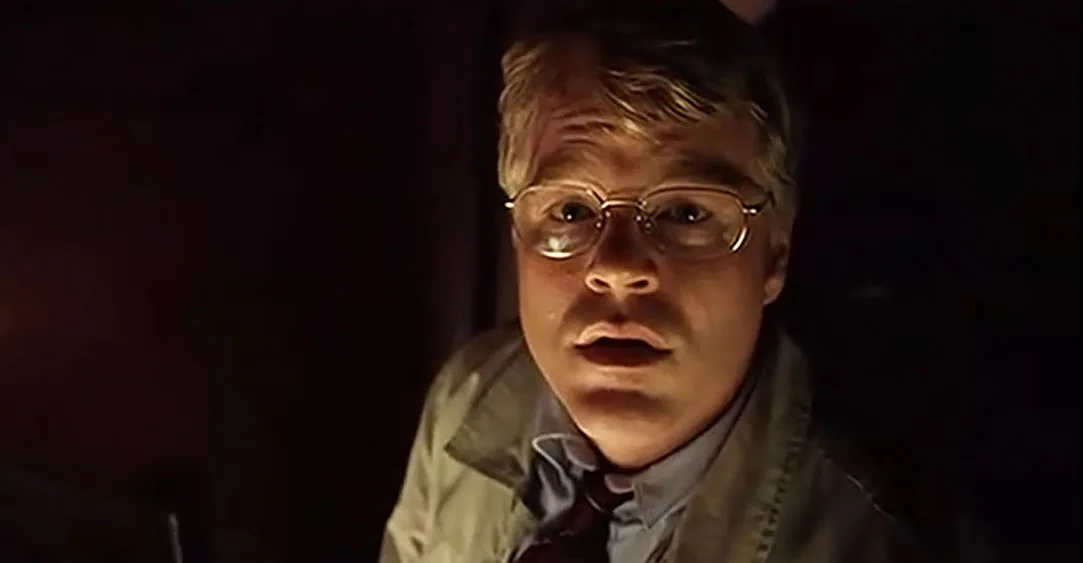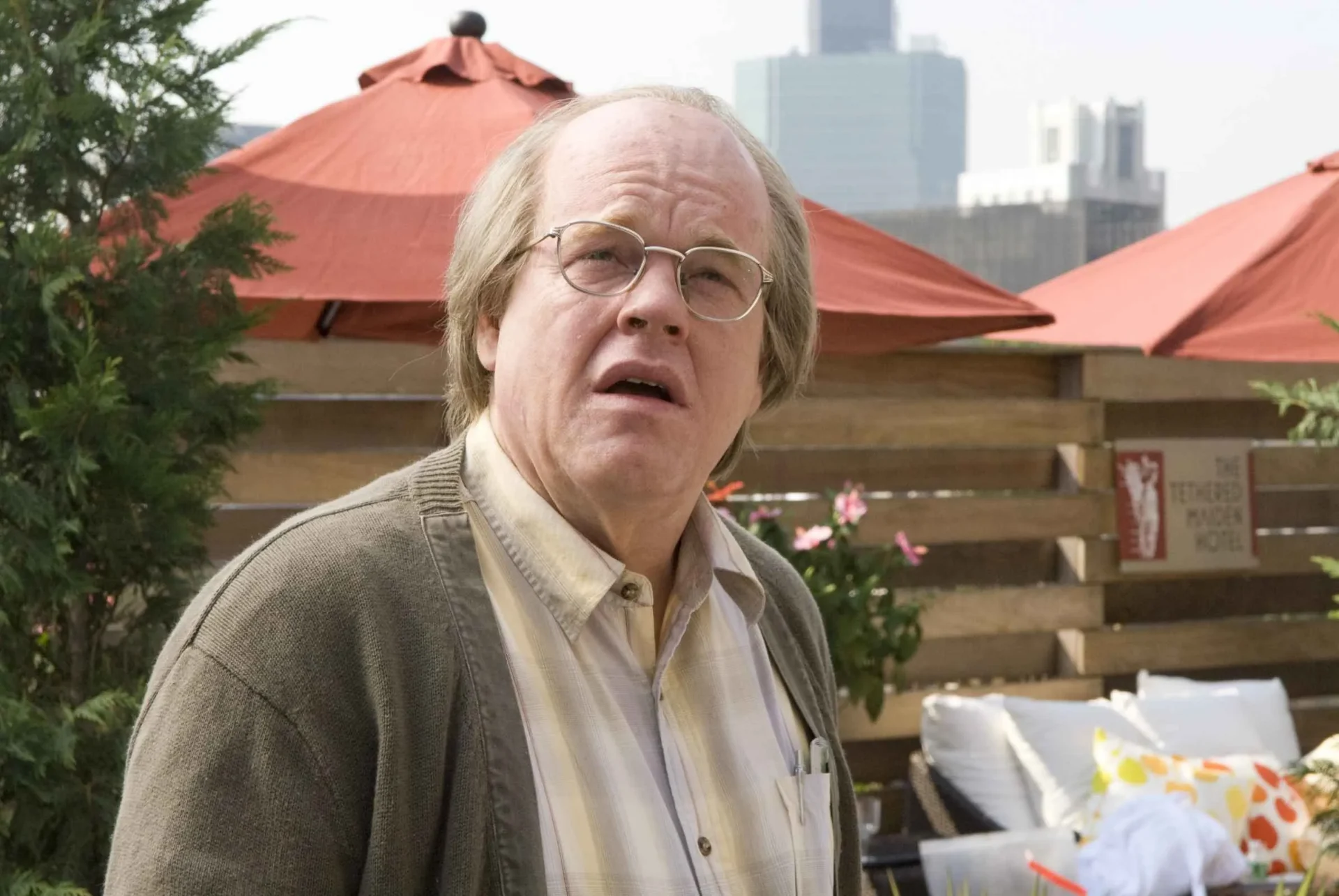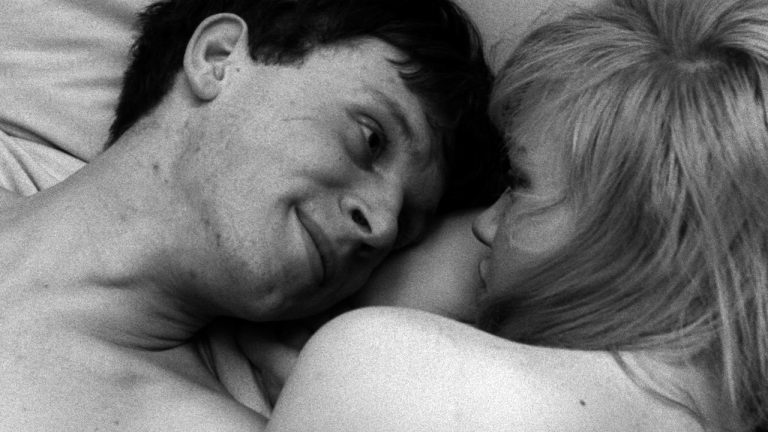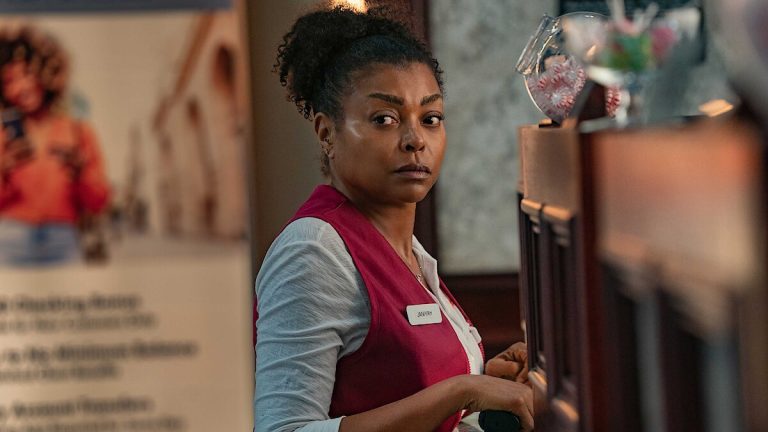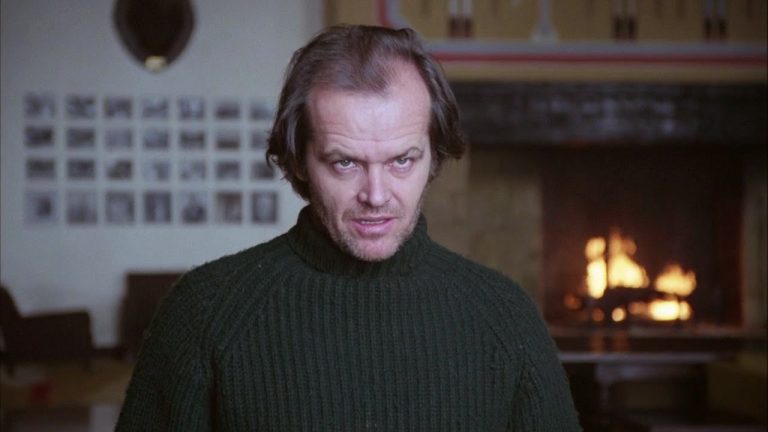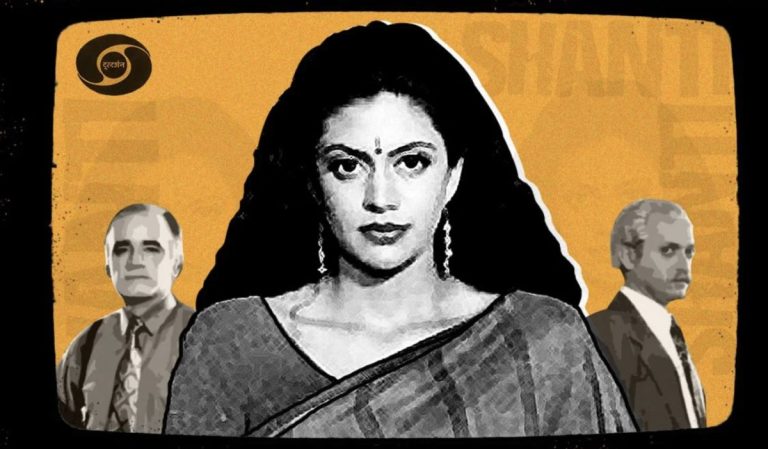In February 2014, cinema and the film industry mourned the loss of one of its most extraordinary talents: the versatile, one-of-a-kind actor Philip Seymour Hoffman. In the 1990s, he established himself as the go-to character artist for an emergent wave of indie auteurs, including Paul Thomas Anderson, the Coen Brothers, and Cameron Crowe. By the time of his richly deserved Academy Award for Capote in the mid-2000s, he had firmly established himself as capable of carrying challenging dramas entirely on his own. Since his tragic passing, the family name has been carried on through his son Cooper, who delivered one of last year’s finest performances in Licorice Pizza, directed by his father’s old pal PT Anderson.
Spanning ensemble dramas, black comedies, action capers, and biopics, here are the ten best films in the Hoffman repertoire.
10. The Boat That Rocked, 2010
Richard Curtis – the English rom-com doyen behind Love Actually, Notting Hill, and Four Weddings and a Funeral, among others – isn’t for everyone. His lovestruck sincerity can certainly grate on viewers, but in his biggest financial disappointment, The Boat That Rocked, his earnest passion for the subject matter of pirate radio results in a refreshingly raucous comedy.
Hoffman stars in an ensemble cast alongside Curtis’ usual stable of British heavyweights (Bill Nighy, Emma Thompson, Kenneth Branagh) as ‘The Count,’ a brash and spirited American at the forefront of the burgeoning pirate radio scene in the North Sea. Hoffman’s career was built on these sorts of performances: Lovable eccentrics and oddballs with good intentions. By 2009, he was so at ease as a performer that an effortless joie de vivre emanated from ‘The Count’ and his swinging lifestyle. Even as Curtis’ screenplay runs out of steam in the final act, Hoffman and his fellow performers keep the film innately watchable.
9. Mission: Impossible III, 2006
As the Mission: Impossible franchise goes from strength to strength under Christopher McQuarrie’s guidance and Tom Cruise’s renewed reputation as the savior of Hollywood, the original trilogy is beginning to fall by the wayside in cultural memory. And that’s a real shame because J.J. Abram’s third entry into the series was itself seen as a comeback from the pomposity of the ill-fated MI2, restoring the franchise’s credibility after a seven-year break by solidifying what makes these films so successful: A careful blend of action and comedy, and a strong supporting cast to fill in the blanks around the relatively anodyne protagonist.
Hoffman compensates for MI3’s deficiencies in writing and some shaky moments from Abrams in his feature debut. While Abrams’ struggle to leap from television to film can render some dialogue scenes amateurish, Hoffman’s performance as the arms dealer Owen Davian squarely places the movie in the realm of classic spy capers, the greatest Bond villain there never was. The supporting cast is further strengthened by Michelle Monaghan as Cruise’s girlfriend, adding a tragic romantic angle to the franchise, which remains the primary source of drama to this day. Ving Rhames and Simon Pegg also excel as IMF lackeys and de facto audience surrogates – like us, they’re simultaneously baffled by and enthralled by Cruise’s stunts. Overall the film coalesces into one of the series’ highlights, in no small part thanks to Hoffman’s contribution.
8. Magnolia, 1999
Twenty years and change has taken some of the sheen off of Paul Thomas Anderson’s Magnolia, a sprawling ensemble drama that so captured the zeitgeist of 1999. In hindsight, the themes of coincidence and chance seem somewhat banal as the explosion of films with these complex interconnected storylines waned. However, what Anderson brings, even in the earlier stages of his career, is a restless momentum, buoyed by terrific editing and Aimee Mann’s soundtrack, that evokes the highlights of Robert Altman’s older masterpieces.
Here, Hoffman is just one of many A-tier performers getting to strut their stuff. His character, the nurse Phil Parma, is pivotal to Magnolia’s most enthralling subplot, attempting to forge connections between a dying patriarch (Jason Robards), his estranged son (Tom Cruise in fine fettle as a misogynist motivational speaker), and his trophy wife (a histrionic Julianne Moore). Hoffman undertakes his role with a palpable vulnerability, a gentle and kind soul thrust into circumstances beyond his control. Such is his inherent awkwardness that when he purchases pornographic magazines later in the film, his motives are unclear. Still, once the magazines arrive and his altruistic intentions are revealed, the life-affirming moment gives Magnolia its continued charm.
7. Happiness, 1998
Happiness is one of those rare movies whose sense of provocation has not died down in the quarter-century since its release. Though many filmmakers have taken influence from Todd Solondz’s ink-black critiques of social mores and distinctive framing, few have had the guts to tackle the subject matters he does here. This black comedy’s frank depiction of pedophilia led to it being blacklisted from the Sundance Film Festival; the Europeans, however, were more accepting, as Solondz won the FIPRESCI award at Cannes.
As with most 1990s Hoffman performances, he plays a character on the fringes of social acceptability. Allen, a sweating, lumbering, awkward heap of a man, forges a strange connection with a gorgeous, successful author, only for his fantasies to be undone once they meet. In this strand, Solondz explores the barriers between like-minded people and the repression of sexual desire because of said boundaries. While Happiness grabbed headlines with its molestation storyline, Hoffman and his co-star Lara Flynn Boyle provide the film’s beating heart. In the subtler forms of unhappiness, the film finds the same sources of dissatisfaction fueling the most heinous crimes.
6. The Savages, 2007
The crux of The Savages’ story is just as bleak as Happiness: siblings Jon and Wendy are emotionally scarred from their abusive upbringing and must confront this fact while caring for their father. However, in the hands of such capable performers as Hoffman and co-star Laura Linney, this overlooked 2007 film from Tamara Jenkins perfectly straddles the lines between drama and the darkest of comedy. The screenplay is unafraid of asking the big questions about the nature of mortality or abuse, but what could seem stagey or overly written on the page is brought to life by the cast, who imbue Jenkins’ film with the heartbreaking realist streak that has defined her career thus far.
Hoffman’s character Jon is a playwright torn between the dueling responsibilities of caregiving and his artistic ambitions, which he shares with his sister. The performance is deeply affecting, conveying the frustration and compassion of a layered character, rendering Jon arguably the film’s emotional compass and primary source of empathy among audience members. In one scene, he confronts Wendy over the material reality of suffering and death, all the “piss and shit” which fill up end-of-life homes, surmising Jenkins’ observations in the most heartbreaking terms. It may appear a hard sell on the surface, but there’s enough charm and pathos in The Savages to warrant a recommendation.
Read More: All Paul Thomas Anderson Movies Ranked
5. 25th Hour, 2002
Spike Lee’s brooding post-9/11 polemic 25th Hour is one of the best films of the new millennium, strengthened by Hoffman’s excellent performance as a school teacher whose clean-cut, risk-averse lifestyle contrasts significantly with protagonist Montgomery (Edward Norton). “Monty” faces seven years behind bars for drug-related offenses and plans for one last night on the town with his lover Naturelle (Rosario Dawson) and two childhood best friends. The following 2 hours is a fascinating character study, biting social critique, and a showcase for some of the industry’s finest performers.
Hoffman’s character Jacob appears deeply misplaced among Monty’s current group of friends, deeply uncomfortable in their travails throughout the evening and especially in his interactions with Mary, a student of his who befriends the group. His obvious attraction to the teenager masks the concealed desires of a lifetime spent on society’s ‘good side,’ juxtaposing the amoral contradictions that follow Monty and their other friend Frank, a womanizing stockbroker played with incredible smarm by Barry Pepper.
Nevertheless, the strength of his bond and loyalty to Monty is never questioned as the pair converse down the haunted alleyways of 2002 New York. The specter of the city’s recent terror attacks looms over the characters, marking 25th Hour as one of the first films to grapple with the consequences of that notorious day and perhaps still the most successful.
4. Capote, 2005
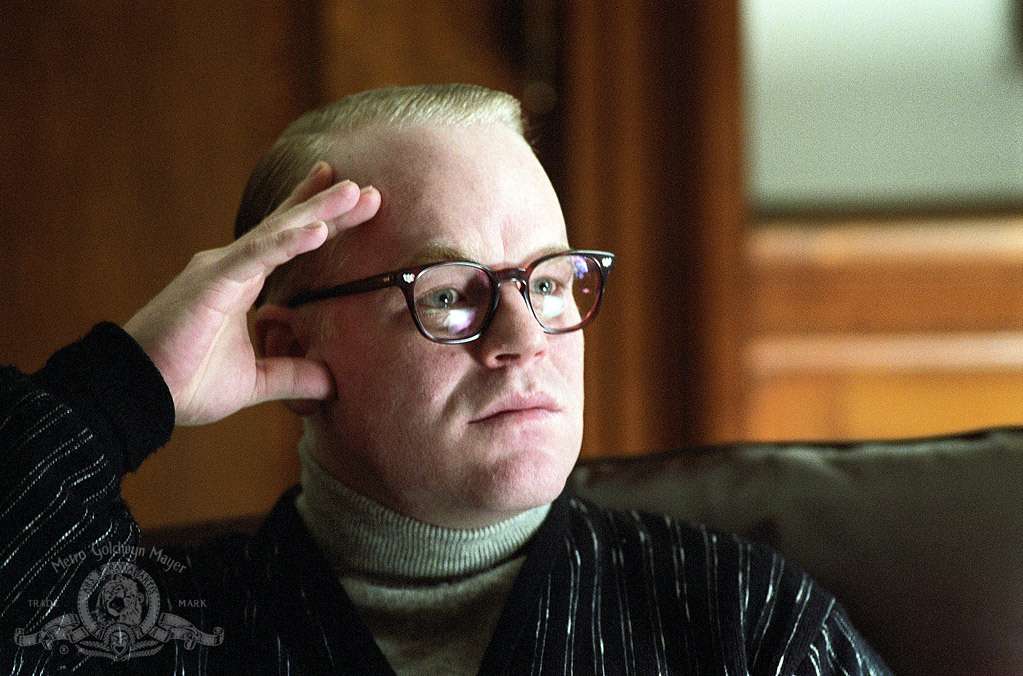
The film that won Philip Seymour Hoffman his only Academy Award is a fairly ordinary biopic elevated to new heights by one of the most touching performances of the actor’s career. As a filmmaker, Bennett Miller has always excelled at competency above all else, and his solid formal grasp in Capote is the right level of subdued to emphasize the power of Hoffman’s turn embodying as the famous writer.
Hoffman thoroughly interrogates the complexities of Capote’s personality as the writer becomes involved in the murder mystery, which would inform his true crime classic In Cold Blood. His fixation with the tiniest minutiae of the case and the inner turmoil of a killer sees Miller warp reality around Capote’s fractured psyche, the lines between fiction and non-fiction beginning to blur. The flowering of true crime content in the past decade makes this film feel especially prescient in its exploration of the ethics of investigative journalism and the human cost of artistic achievement. However, above all, the film and Hoffman’s performance are a poignant tribute to the enduring literary figure it depicts.
3. Synecdoche, New York, 2008
Hoffman again channels an artist at work in Charlie Kaufman’s challenging existential drama Synecdoche, New York. The theatre director Caden Cotard is attempting to balance the strains of his personal and professional lives, as symbolized overtly by the replica of New York City he is constructing in an abandoned warehouse. His work allows him a space to make sense of his life (including the tragic lamentation of his relationship with his daughter), with the structure of the film fluctuating in a way typical of Kaufman’s previous works as a screenwriter on hits such as Adaptation. and Being John Malkovich.
As a first-time director, Kaufman is remarkably assured in his vision, handily assisted by a who’s who of talent behind the scenes – cinematographer Frederick Elmes transplants the keen eye for framing he had utilized with David Lynch and Jim Jarmusch in previous decades effortlessly to Kaufman’s distinctive world of metaphors. Moreover, Jon Brion’s score is punchy and poignant in equal measure. As Kaufman’s visibly clever screenplay tows the lines between nihilism and a beautiful acceptance of life’s flaws, Hoffman stabilizes and coalesces the writer’s varying ambitions into this almost harrowing portrayal of a deeply flawed man and life.
2. Doubt, 2008
Above all else, Doubt is an actor’s showcase, pitting Hoffman against the finest actress of her generation (Meryl Streep) and an exciting up-and-comer by the name of Amy Adams. Using the cultural conservatism and repression of the Catholic faith as an umbrella, playwright-cum-director John Patrick Shanley explores fear, paranoia, and compassion in this tale of an enigmatic priest suspected of abuse. The uncompromising principle Beauvier (Streep) is strongly suspicious, while the allegiances of the victim are deliberately ambiguous. In this triage of tension, thought-provoking questions about the nature of guilt are posed. The answers to these questions are left up to the viewer to decide.
In transferring his Pulitzer and Tony-award-winning play to the screen, Shanley finds new depths to his original “parable.” The characters are so richly drawn that every performer is bound to bring their interpretations to the text, and so it proves as Streep, Hoffman, and Adams all find new dimensions to their complex characterizations. Despite Shanley’s trademark dialogue technique comprising short, snappy, David Mamet-esque exchanges, Doubt’s power comes from its realism and restraint shown in the visuals, strengthened by subtle production design choices and framing that make the coddling ‘60s Catholic New York environment feel uncomfortably lived-in. The film earned Hoffman a nomination for Best Supporting Actor at the 81st Oscars, and deservedly so.
1. The Master, 2012
In the 1990s, Philip Seymour Hoffman made his name off of playing eccentric lowlifes of both the loathsome and empathetic kind. However, the top two entries on this list have excelled by emphasizing Hoffman’s natural charisma as a man and performer, using said charisma to explore the power structures that define our lives. In his fourth and final collaboration with Paul Thomas Anderson, Hoffman delivers the best performance of his illustrious career as Lancaster Dodd, the leader of a mysterious cult-like organization called ‘The Cause.’ The real-life parallels between L. Ron Hubbard and the founding of Scientology are clear. Still, the character is an entirely distinctive creation that balances paternal softness with the brute force and fear of a man committed to maintaining the power he possesses.
As a personality, Dodd towers over the fragile, nymphomaniac war veteran Freddie Quell, played by Joaquin Phoenix. Both performers are at the top of their game here, embodying their characters through the subtlest of physical nuances and the loudest of shouting matches. In a famous scene, Dodd gives Quell a survey that attempts to provide healing by evoking memory and regret. Throughout the sequence, both actors elevate their intensity to euphoric heights, capturing the trauma of war and lost love and setting the stage for how Dodd can exploit Quell’s flaws over The Master’s duration. Hoffman’s invaluable contribution to one of the greatest films of the 21st century is the stand out of his too-short filmography and his final outstanding performance before his untimely passing.






